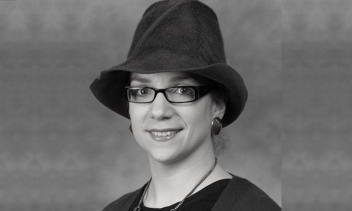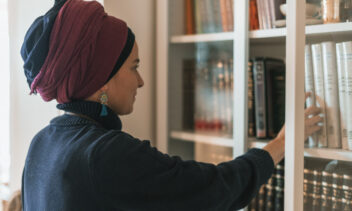A Baal Teshuva’s Father’s Perspectives
By: “David Shub” | October 14, 2021 (First published in February 7, 2006)
As the father of two BTs, the first words of advice to parents of other BTs is to say that you cannot make it a power struggle. Not only is it not a power struggle, but it is not a “fight” of who is right and who is wrong.
If someone had told me these words twenty years ago, when my older child was becoming “frum,” I would probably have become angry. Years of adaptation, adoption, and understanding have softened my initial view points.
Twenty years ago, my wife and I did not understand what was happening to our 14 year old child. The child was raised in a rather non-religious household. (I was raised in a secular Jewish household where religion was often mocked as the “opium of the masses,” but Yiddishkeit was an understood value.) We did join a Reform synagogue so that we would be able to give our kids whatever it was that we were not exposed to. When our daughter studied for her bat mitzvah, she displayed such a passion for Judaism that we thought we had a rabbi in the making. After her bat mitzvah she decided she wanted more, so we allowed her to enroll in a local Sunday Jewish High School that was run by an Orthodox principal and Orthodox teachers. The student body was comprised mostly of children from Conservative and Reform households.
The first “shock” to us occurred when I went one Saturday night to pick up our daughter after a Shabbaton. I walked into the basement of the Orthodox shul, and the students and teachers were sitting in a circle, chanting a strange tune. Periodically, during what I later learned was termed a “kumsitz,” individuals would stand and explain what the Shabbaton had meant to him or her. All I saw was “cult.”
As parents, we did not know where to turn. We knew that we could not deny our daughter’s attraction to this life because she would do things behind our backs. We sought advice of our Reform rabbi and congregation. Better she would have contemplated conversion than to adopt the Orthodox lifestyle, they intimated.
We have adapted, we have adopted, and we try to understand.
High school became difficult for us. Our once athletic child now placed Shabbos before a game. She was going across town to spend Shabbos with friends. We made, what to some seemed a ridiculous decision, to Kasher the kitchen. If your child will not eat at your table, the family unit is destroyed. I remember a family member said to me when she learned what we were undertaking, “No one will come between me and my shrimp!” How foolish a statement.
I will pass over the fights, the arguments, the fears…just to say that we adapted ourselves to what we could no longer fight. Our daughter attended Stern College, a place which we felt was not nearly as academic as she was capable of handling. By the time she turned 21, she had met her “beshert” and had married in a very traditional Orthodox ceremony. I cannot say we “loved” the thick veil, the maheatza, the separate dancing, but we adapted.
Now, there are five grandchildren…and they all sit at our dining room table.
Our son, four years younger than his sister, tolerated much of the arguments in the house while his sister was straying from our path. He honored the Kosher kitchen, he honored the lights and phone restrictions on Shabbas, but he went his own way. He also attended the Sunday Jewish High School, but was not swayed by them. He graduated high school and went on to attend a very prestigious four year college. He graduated with high honors, and moved to Brooklyn where he housed with his college friends. He was the only Jewish boy. He worked in the financial area in New York. When he was around 25, he started to become interested in religion. He also met his “beshert,” although he could not believe that she was Orthodox. Unlike his sister, she was dressed in short sleeves and pants. But there is Modern Orthodox, as well as “black hat” Orthodox. They married in an Orthodox ceremony, with a modern touch. Probably because our daughter paved the way, we were less “stressed” by his route. And, of course, Modern Orthodox is easier to comprehend than the more extreme route.
What do we all want for our children? We hope that they will have married the right mate, and that they will have married into a family that loves and supports them. Our children have done that. Now, we have eleven of us at the dining room table, with a recent high chair with the twelfth addition to the family.
What has been the most difficult aspect to understand? For me, it is probably the covering of the head. Why camouflage beautiful hair with beautiful hair? I still have difficulty understanding that nothing, nothing at all interferes with the observance of Shabbos. I am not totally comfortable with the role of the woman in the family. I am baffled by the laws of “sneis.” I am not comfortable with the Yeshiva education where the secular studies program takes a secondary role.
When my oldest grandson tells me, “Grandpa, you should really wear a kippa,” I respond that “I know…” When my six year old grandson asks me why I drive on Shabbos, I try to explain to him that there are all kinds of Jews.
And when my kids come for Shabbos, we leave the lights on, we do not answer the phone, we make cholent, and leave an urn of water on the counter.
My son-in-law asks me, “Dad, are you thinking of becoming frum?” I respond, “No, not yet.”
In the long run, the Reform temple was wrong. It would not have been better if my children had converted. We have adapted, we have adopted, and we try to understand. It is best that they are Jews and that we sit at the table as a family.
Grandpa of Six (in 2006)
________
A Baal Teshuva’s Father’s Daughter’s Perspectives
Today we have the pleasure of hearing from Yael, the daughter of Mr. Shub as she shares her thoughts on the subject of Parent – Baal Teshuva relationships.
I don’t generally write postings espousing my philosophy on life, but since my father’s recent posting received such a positive response, I figured I would take the opportunity to share some quick thoughts I have developed over the last 20 years.
1. Challenging relationships before teshuva remain at least as challenging after teshuva. Power conflicts, value systems, and conflicting personalities will often be exacerbated with the adoption of a completely foreign lifestyle. I believe these types of relationships are not about teshuva and real, perhaps professional, work, needs to be done to heal. Consider whether placing the blame on frumkeit is perhaps misplaced blame.
2. I assume Rabbi Menken is addressing families where the parent-child relationship has historically been more functional than not. In this case, I believe it is crucial to try to understand the other point of view and to realize how shocking your adoption of a new lifestyle can be. I believe it is necessary to express to your family how much you want to remain part of the family. Sure, we can’t eat in our parents’ kitchen, but tell your parents how much it pains you to eat separately. Be honest. Tell them that you would love to join them for dinner or at a restaurant or at a Saturday afternoon at the beach but you simply can’t. They might not understand the “can’t” part and yes, it may lead to a discussion of you valuing religion over family. This may be an inevitable discussion, but do as much as possible to express and show them that you still love, value and wish to remain close to them. When the time is right, you should sit down together to find creative ways to share your life with them. The beach might be out, but find other avenues for quality family time.
It was the … self esteem that they imbued within me that gave me the strength as a young teen to go against my friends and adopt a life that was so different than all my peers and classmates.
3. Parents often view the adoption of a new lifestyle as a rejection of their values and a rejection of all the years of parenting that they invested. Indeed, it is normal for them to go through a process of “mourning”. New baalei teshuva should try to recognize the loss that their parents are experiencing. Certain family traditions that parents may subconsciously assume will be passed down are destined to end: summers at the beach, Sunday dinner at a favorite restaurant, Saturday matinees. Each family has its own culture and traditions. Adoption of a new lifestyle, undermines all those hopes and dreams. The change of cultural norms can be scary, intimidating and, yes, on some level it represent a loss of power. It is incumbent on baalei teshuva to highlight to their parents those areas of their life that they have not rejected. Show them how much you truly gained from them and those aspects of your behavior, values, strengths and accomplishments you have developed as a result of what they gave to you.
Back in the early years, my parents often told me that they raised me to be a liberal, open, independent thinker, a girl who would grow into a woman who could accomplish anything. My mother used to tell me that every door was open to me. I could become the first female president of the US if I wanted. To suddenly see this daughter behind a mechitza can be very disturbing. As my Dad mentioned in his post, it is an issue he is still grappling with despite all his adaptation, adoption and understanding. Over the years, I have repeatedly told my parents that it was their influence and encouragement to explore, think, and be independent that lead me to frumkeit at such a young age. It was the (and I wish I knew what they did so I could impart it to my own children) self esteem that they imbued within me that gave me the strength as a young teen to go against my friends and adopt a life that was so different than all my peers and classmates. Self esteem is so necessary in so many areas of life not the least of which is managing a busy household while juggling all the responsibilities of a frum lifestyle as mentioned in previous posts.
Individuals will have their own “mesorah” of what they inherited from their parents. As we move through different stages of our lives we will often come to recognize more and more of what our parents gave to us. How often do I look at the experiences I seek to offer my children and realize it was those same experiences that my parents gave to me? So whether it is a love of music, the outdoors, hiking, cooking, or model train building realize that it is your parents you need to thank. Showing your parents that you have maintained aspects of their ‘mesorah’ has the power to bridge gaps of understanding and build healthy relationships between generations.
In summation, when mentoring others perhaps it would be helpful to help young BTs explore themselves. Once a person understands herself, she can be better equipped to express herself to her family and share with them common life experiences.
4) Maintain a sense of humor. I believe humor can save you many times in so many different relationships. Relax. Be able to laugh at oneself and one’s situation. When I was about 16 I read Rabbi Adin Steinsaltz’s book entitled Teshuva. His words had a profound impact on me. Here is my all time favorite quote (p.51) :
“…one must learn to smile. It is not advisable to do everything grimly and fearfully, some things can be taken more lightly and in many contexts cheerfulness is permissible. It is not only a matter of avoiding sadness which the sages considered the worst of sins, but of keeping a sense of proportion, saving ones seriousness and grim determination for situations where they are needed. Judaism presents a particularly difficult spiritual challenge, for it asks us to live a life of holiness, not in monastic seclusion, but out in the world. It is a challenge that calls for balance and a sense of humor.”
5. Finally, to ensure a smooth transition, I would suggest getting an older sibling to go through the process before you. Let them be the guinea pig and smooth the way. Hey, when my younger brother became frum, he had it sooo easy 🙂








